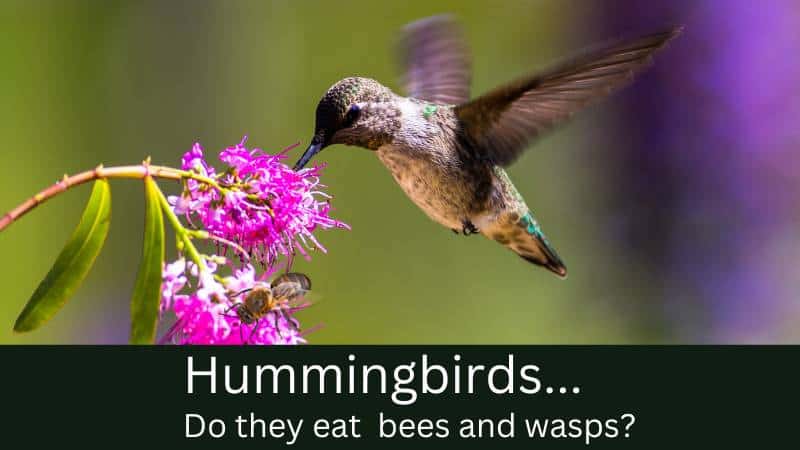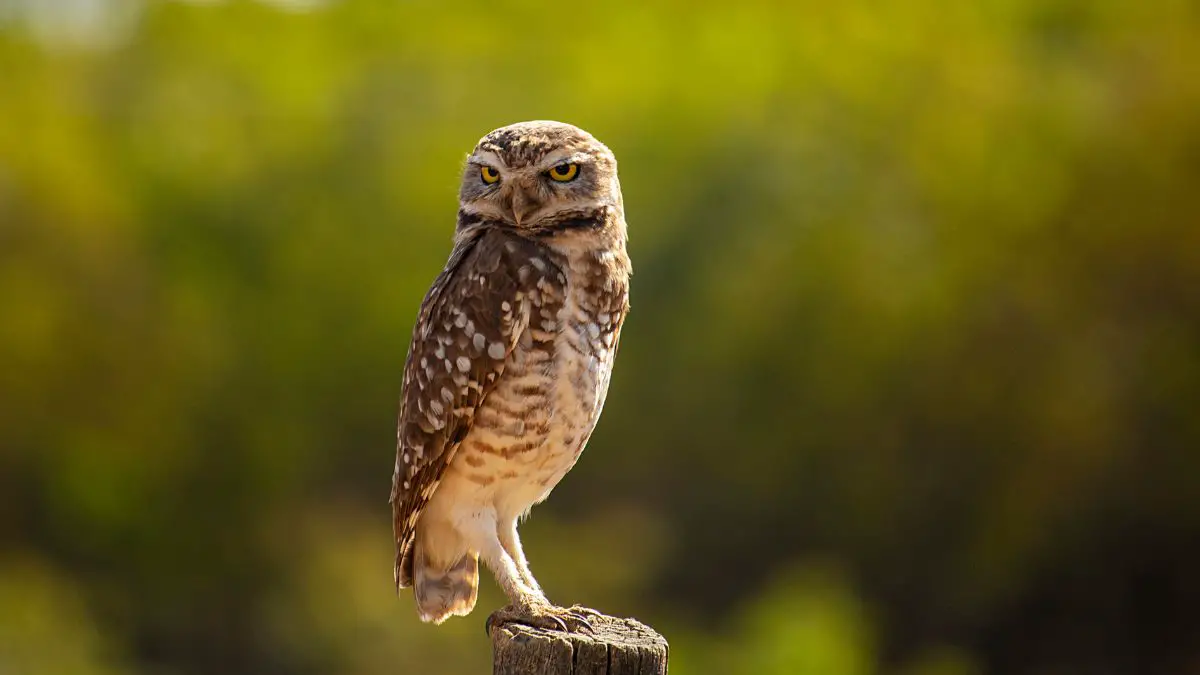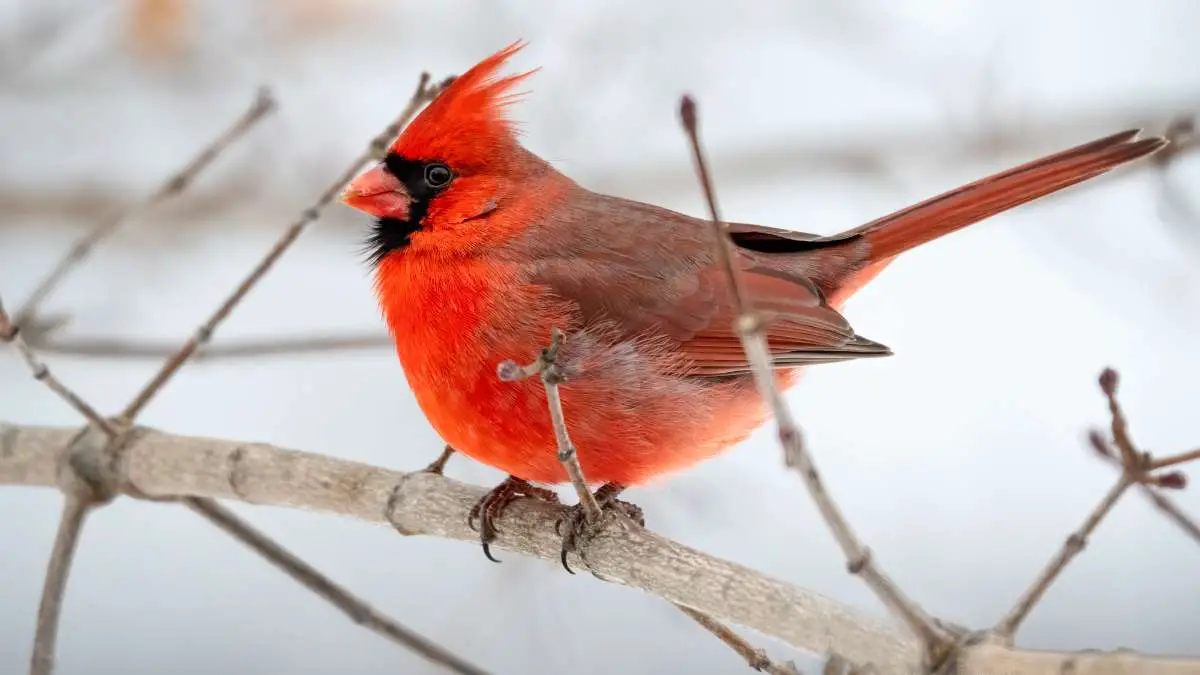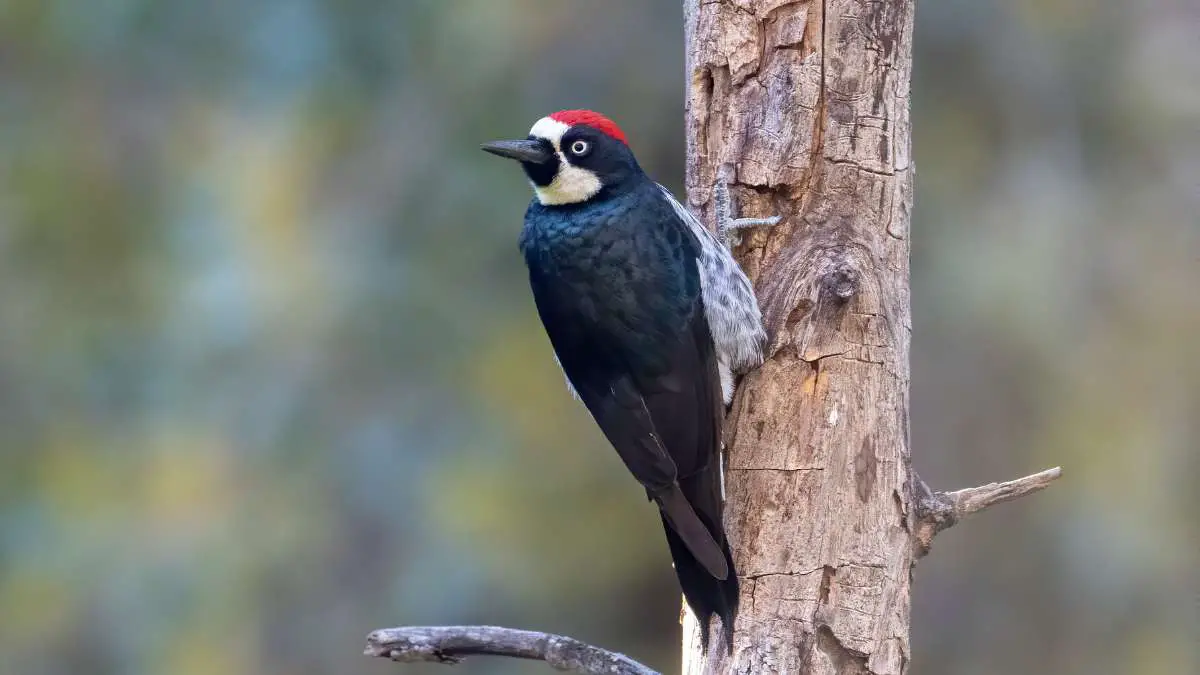Hummingbirds, bees, wasps, and butterflies have one thing in common. They all love flower nectar. But, hummingbirds are nectarivorous and opportunistically insectivorous. And, research has shown that about 90% of the hummingbird diet consists of flower nectar in general.
So, can these tiny birds be a threat to bees and wasps? Do hummingbirds eat bees and wasps?
Here, I’ll explore more on what hummingbirds eat, whether they eat bees and wasps, and how they compete with bees and wasps for food. And, how to keep bees and wasps away from hummingbird feeders.
So if you’re a hummingbird-lover or just curious about these little creatures, keep reading to learn more!
Do hummingbirds eat bees?
Both hummingbirds and bees can be found near flowers and other nectar sources. Knowing hummers eat insects, many people wonder if hummingbirds eat bees.
The answer is that hummingbirds generally do not eat bees. In fact, hummingbirds and bees have different diets and are often found in different types of habitats. Hummingbirds primarily eat nectar from flowers.
And they have long, thin beaks that are well-suited for reaching into flowers to extract the nectar.
Bees, on the other hand, primarily eat pollen and nectar. And they have short, stubby bodies and legs that are well-suited for carrying pollen.
Even though sometimes hummingbirds and bees occasionally come into contact with each other at nectar sources, they do not typically compete for food. And both hummingbirds and bees are very important pollinators.
Do hummingbirds eat wasps?
Wasps are also insects and may look like a nutritious meal for hummingbirds. But, similar to bees, wasps also do not get any threat from hummingbirds.
Hummingbirds do not consider wasps as a potential food source since wasps are too big and aggressive to handle, though there are tiny wasp species as well. Hence, they do not take any risk of a counterattack.
But, do hummingbirds and wasps end up fighting each other for any reason? Most probably this can happen since they may cross each other’s path when looking for food and wasps are aggressive enough to challenge.
So, if they get into a fight, who will win? It can go both ways. There are records of hummingbirds killing wasps and getting killed by wasps. However, none of them kills the other for food.
What kind of insects do hummingbirds eat?
Hummingbirds drink nectar to get the energy and nutrients they need to support their active lifestyle. But, hummingbirds also need protein and other nutrients, especially during breeding, and to get that they eat insects. But it only comprises around 10% of their diet.
Hummingbirds have been known to eat a variety of insects, including ants, aphids, beetles, flies, moths, and spiders. Most of these insects are small enough for hummingbirds to catch and eat easily.
Hummingbirds are attracted to sugar water from feeders, which can also attract small insects. So, in addition to eating insects that hummingbirds catch in flight, they also eat insects that are attracted to their feeders. These insects can become part of a hummingbird’s diet when they visit the feeder.
Are hummingbirds afraid of bees and wasps?
We like watching hummingbirds, but do you like bees or wasps flying around you? I hope the answer is no if you are just like me (don’t get me wrong. I appreciate the contribution of bees to our ecosystem, but I don’t like them roaming around me).
Bees and wasps are common visitors to gardens. And they can be dangerous to humans and other animals. But are hummingbirds afraid of bees and wasps?
No, hummingbirds are not afraid of bees and wasps. Even though hummingbirds are smaller in size, they are also agile and quick. This allows them to avoid bees and wasps easily when they get an attack.
When it comes to defending themselves and their territories, hummingbirds become aggressive. So, they may fight back if they get any attack from bees or wasps.
Do bees sting hummingbirds?
If you even got stung by a bee, you know the pain. So, if they do it to this tiny hummingbird, what will happen? But wait, do bees sting hummingbirds?
No. Bees do not typically sting hummingbirds. Hummingbirds and bees belong to different taxa of animals.
Hummingbirds are part of the bird order Caprimulgiformes (bird taxonomists recently lumped Apodiformes into Caprimulgiformes) and bees belong to the insect order Hymenoptera.
In general, bees sting other insects as a form of self-defense or to protect their hive. But they are not known to attack hummingbirds.
In fact, hummingbirds and bees often coexist peacefully, with the bees collecting nectar from flowers and the hummingbirds feeding on the nectar as well.
However, it is important to note that hummingbirds are not immune to the stings of bees and wasps.
They can be injured or killed by these stinging insects if they are attacked. Therefore, it is important to take steps to protect hummingbirds from bees and wasps in your garden.
Hummingbirds vs bees and wasps: A battle for nectar
While hummingbirds, bees, and wasps may all compete for nectar from flowers, they are actually not in direct competition with each other.
In general, hummingbirds feed on nectar from a variety of flowers, using their long beaks and tongues to extract the sweet liquid.
Bees and wasps also feed on nectar, but they do so to gather food for their hives rather than for personal consumption.
In fact, bees and hummingbirds are important pollinators, helping to fertilize flowers and ensure the continuation of plant species.
While hummingbirds, bees, and wasps may all be attracted to the same flowers, they generally do not interfere with each other’s feeding.
As a result, these three types of insects can often be found coexisting peacefully, each going about their own business and benefiting from the availability of nectar. But there are some occasions where Wasps aggressively attack Bee hives.
But, will hummingbirds feed from Feeders if bees are around?
Hummingbirds will generally continue to feed even if bees are present. Even at feeders, if the supply is enough to feed all the creatures attracted to it, hummingbirds will not be bothered about bees and wasps roaming around.
However, attracting many insects such as bees and wasps may make the feeders dirty quickly. If you do not clean feeders regularly and if it gets contaminated with dead bugs or remaining waste food, hummingbirds will stop visiting them.
Hummers would never drink spoiled nectar in feeders.
Additionally, since the main requirement of all these creatures is a continuous food supply, if more insects and birds are attracted to a few feeders, conflicts between them can happen.
Hence, if you want to attract hummingbirds to your garden with feeders and do not like them being challenged for food by bees and wasps, better take necessary actions to discourage bees and wasps from coming.
How to keep bees away from hummingbird feeders?
Some are wondering if there are any bee repellents that can be used in feeders to discourage bees from coming to them. But, do not go looking for one.
There are no specific bee repellents designed for use in hummingbird feeders. Instead, there are a few steps you can take to prevent bees from accessing the nectar in your hummingbird feeder.
1 – Clean your feeders regularly:
Bees are attracted to the sweet scent of nectar. So a dirty feeder can be more likely to attract them. So, how can you clean feeders? Simply mix one part white vinegar with four parts water and use this solution to rinse the feeder thoroughly. Let the feeder air dry before refilling it with nectar.
2 – You can use a hummingbird feeder that has bee guards (or bee guards that can be added to your feeder)
Bee guards are small plastic or metal barriers that prevent bees from reaching the nectar. But those guards allow hummingbirds to feed.
You can also use a feeder that has a built-in ant moat. It is a small reservoir filled with water that ants and bees must cross in order to reach the nectar.
The water acts as a barrier and prevents the insects from reaching the feeder.
Here are several bee-proof hummingbird feeders
- Aspects HummZinger Hummingbird Feeder: This feeder has a bee-resistant design, with a bee guard on each of the feeding ports. It also has a built-in ant moat to keep ants away from the nectar.
- Perky-Pet Antique Bottle Hummingbird Feeder: This feeder has a vintage design and features a bee guard on each of the feeding ports. It also has a built-in ant moat to prevent ants from reaching the nectar.
- More Birds Hummingbird Feeder: This feeder has a bee-resistant design and features a bee guard on each of the feeding ports. It also has a built-in ant moat to keep ants away from the nectar.
3 – Try to position your feeder in a location that is less attractive to bees.
Bees are mostly attracted to colors such as blue, violet, and purple and less attracted to red. But, red is one of the main colors hummingbirds are attracted to.
So avoid placing your feeder near brightly colored plants or flowers that bees are attracted to. Instead, choose a location that is shaded and away from other sources of nectar, such as flowering trees or shrubs or a location having mostly red flowering plants.
By following these tips, you can help to keep bees away from your hummingbird feeder. And ensure that the hummingbirds have access to the nectar they need.
Does peppermint oil keep bees away from hummingbird feeders?
It is not recommended to use peppermint oil to deter bees from coming to hummingbird feeders. While peppermint oil is often used as a natural insect repellent, it is not effective at repelling bees.
In fact, some studies have shown that peppermint oil can actually attract bees, rather than repel them.
Additionally, using peppermint oil in a hummingbird feeder can be harmful to the hummingbirds. Hummingbirds have a highly sensitive sense of smell and the strong scent of peppermint oil can be overpowering for them.
Ingesting nectar that contains peppermint oil can be harmful to hummingbirds and can cause them to become sick.
So, instead of using peppermint oil, I would recommend you implement previously suggested methods to deter bees and wasps from coming to feeders.
Have you ever seen hummingbirds interacting with bees or wasps? Let me know if you have any experiences to share on the topic.
You may also like reading:




